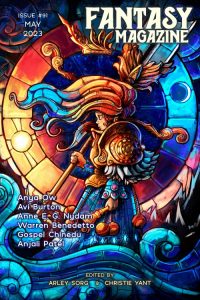Karen Burnham Reviews Short Fiction:Future SF Digest, Clarkesworld, and Asimov’s
 Future SF Digest 3/22
Future SF Digest 3/22
Clarkesworld 3/22
Asimov’s 3-4/22
Now more than ever I’d like to put the work of Future Science Fiction Digest front and center. Since 2018 it has been unusually strong in bringing voices from around the world to readers, both in English and in translation. As I write this the war in Ukraine is a few weeks old, and editor Alex Shvartsman writes movingly in the Foreword about his home of Odessa in Ukraine. The cover art is by Ukrainian artist Oleksandr Kulichenko. Shvartsman makes a case that I found persuasive for maintaining links between artists, even when countries are behaving villainously: “We will also continue publishing works by authors from Russia and Belarus, save for the few who are actively and gleefully using their notoriety to support the war. It’s counterproductive and downright ludicrous to close one’s mind to the voices of those living under the political regimes one might not like. If given a chance, we’d just as gladly publish authors from North Korea, Iran, the Donbas region, or Venezuela, so long as they wrote a compelling story. In fact, this issue includes a story from Cuba alongside works from USA, the UK, China, and Sweden.” He also points readers to resources to help the Ukrainian people and support Ukrainian authors.
Looking at the stories in this issue, my favorite is “Rat’s Tongue” by Xing Fan (translated by Judith Huang), which I believe is a debut. Ding Jie is sent to a frozen planet in the far reaches of the galaxy to procure a delicacy for the Emperor – the tongue of the Silver Rat. Eaten raw, its deliciousness causes not only other food to pale in comparison, but even other sensory wonders as well. However all tongues harvested recently have been blackened and toxic. Ding Jie uses a brain implant to follow one of the rats remotely back to its home, and he learns about the civilization of these clearly sentient beings – and how their tongues play a major role in that society. It’s a fascinating concept that goes into much deeper territory than one of the other gustatory stories brought to mind – “From Gustible’s Planet” by Cordwainer Smith (1962).
Will McIntosh’s “A Friend on the Inside” features Candace, a poor teen who will soon be kicked out of the public school system (which you have to pay for after a certain age). She hacks into Axonet, looking to try to manipulate her school account, and meets Izzy, a disembodied presence on the net. Adventures ensue as she learns more about what Izzy is and how he and countless others, possibly including her own late sister, are being exploited. The climactic conflict involves an omnipresent and plenipotent corporation battling its own equally nigh-omnipotent net system. “The Sweetness of Berries and Wine” by Jo Miles imagines a family on a science station way out in the outer Solar System. Shoshana desperately wants to give her young daughter a proper seder, but she can’t procure all the ingredients for a meal that matches her traditions. A call to her Bubbe gives her perspective on making do (and a recipe).
The stories in March’s Clarkesworld range from the intensely personal to the cosmic. “Rain of Days” by Ray Nayler focuses on Sandra in an elder home, widowed from the wife she can’t even bear to name anymore. The memory therapy offered by the facility hasn’t really helped, but a huge crashing tsunami on the coast might. There’s some great color commentary by her co-residents as well. “Saturn Devouring His Son” by E.A. Mylonas looks at the toll being in a Company town can have on families. Pa works for a pork processing plant, and the company is very generous in funding prosthetics when he loses first one arm and then the other (and later when son Danny loses a leg). Jacob, gay, wants no part of that life anymore and only comes back for Pa’s funeral. Danny has grown into a true Company man, but something about the loss might put a chink in that armor.
In “The Memory of Water” by Tegan Moore, a marine biology conference is being held at the Ocean resort where the now dead seas are remembered through themed rides. Camille is the general manager and gets called in when the responsive algorithms that tailor the experience to each guest start glitching, presenting bizarre images. As the biologists are mourning the death of the last whale, Camille is not sure how to feel about the death of her not-quite-ex husband, and different scales of grief are a big part of the underpinning of the story. While I felt like the story ended right before the true climax, I have to say that (while I want to preserve and restore our oceans), I would pay a lot of money to go on the ride through the Devonian ocean as described here. “Commencement Address” by Arthur Liu (translated by Stella Jiayue Zhu) imagines the relationship between a father and daughter in a future where he’s a “dream architect,” someone who can program AR and VR experiences in people’s brains, and she’s bright with potential to do the same. When the perception of time and space is completely malleable, there’s no end to what can be done – even as someone is in the process of dying.
“Meddling Fields” by R.T. Ester branches out to the multiverse even as its protagonist, Ransom Nu’Terra, is doing everything possible to preserve the current timeline. To that end she visits the home acreage of a “meddler,” someone who is more willing to illicitly keep fragments of a meteor that allow for bridges between parallel worlds. As she’s talking with Timoh and observing his family, things get stranger as the day wears on, especially when she sees a daughter playing with a friend that might as well be her twin. By the end she’ll be looped into a conspiracy that goes well beyond her own time and space.
The March/April issue of Asimov’s, with guest editor Kelly Lagor, includes a novella, five novelettes, seven short stories, and five poems. It leads with a novelette by Ray Nayler, “Mender of Sparrows”. Looking at this, his story in Clarkesworld in March, and his recent string of high quality publications, he’ll be ready for his first collection any minute now. In this story Himmet is an intelligence veteran in Belgrade, confined to a ghetto with other androids. He rescues birds and takes them to another android acting as a kind of vet. But at the start of this story he finds a sparrow with something quite a bit different than a broken wing, something that sets off a new round of cloak and dagger. Arie Coleman is a newcomer, and her story (also bird-referencing) “The Magpie Stacks Probabilities” is impressive. Emma is the survivor/hero of an Analog-style story in which she survived a close call in space using only her wits and the tools that were (just barely) within her reach. But now back home and reunited with her family, the experience hasn’t let her go. She’s squirreling away small items that might be useful in all kinds of handy niches, such as couch cushions, and so is her young son Drew. Her wife Lindy isn’t quite sure how to handle this – traumatic experiences affect families as well as individuals.
Will McIntosh brings us an intense novelette in “Dollbot Cicily”, which plays with somewhat similar themes to his story in Future SF Digest. Cicily is a homeless woman trying to scrape together enough to get an apartment and get her daughter out of the “care” of the state. She discovers that a modeling job she’d taken once led to a line of sexbots being created in her image. In a fit of rage-induced hacking, she’s able to take control of some of the sexbots remotely and see how they’re being used. She ends up manipulating each of the three men she’s able to access in very different ways. The aftermath of a car accident, which also led to her slide into homelessness, makes it hard to juggle these multiple assignments, and things go awry. While the premise might seem offputting, McIntosh handles the many layers of the story adroitly. Paul McAuley brings a wonderful storyteller’s voice to life in “Maryon’s Gift”, where a planet is discovered that has life but has clearly been untouched by the different client species that roam around networks of wormholes. A sect of Gaians vow to keep anyone from landing, and the cat-and-mouse games that ensue are described with some relish.
Michael Cassutt brings us “Aurora”, in which Vera is the retired, alcoholic director of a space laser program. She’s called up on an emergency basis since her research program is one of the only things that might save a doomed Russian space mission. While much hinges on something as simple as password recovery, she also starts to emerge from her misanthropy. Jack McDevitt & Larry Wasserman bring us a depressing parable on the perils of space junk in “The Gold Signal”. Leah Cypess brings us a story in the form of a group chat in “Giveaways”. When one member starts offering up most of her stuff to any taker, the group devolves into snarking about people who choose Uploading. But will anyone take that sourdough starter?
Recommended Stories
“The Magpie Stacks Probabilities”, Arie Coleman (Asimov’s 3-4/22)
“Dollbot Cicily”, Will McIntosh (Asimov’s 3-4/22)
“Rat’s Tongue”, Xing Fan (Future SF Digest 3/22)
This review and more like it in the May 2022 issue of Locus.
 While you are here, please take a moment to support Locus with a one-time or recurring donation. We rely on reader donations to keep the magazine and site going, and would like to keep the site paywall free, but WE NEED YOUR FINANCIAL SUPPORT to continue quality coverage of the science fiction and fantasy field.
While you are here, please take a moment to support Locus with a one-time or recurring donation. We rely on reader donations to keep the magazine and site going, and would like to keep the site paywall free, but WE NEED YOUR FINANCIAL SUPPORT to continue quality coverage of the science fiction and fantasy field.
©Locus Magazine. Copyrighted material may not be republished without permission of LSFF.







